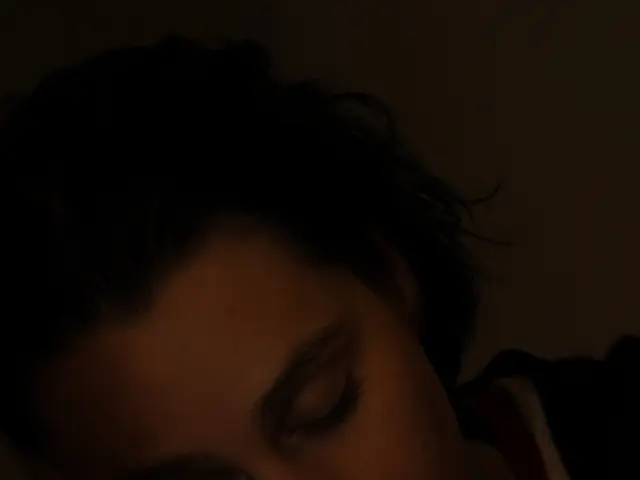Achieve Restful Sleep through Breathing Techniques Tonight
Revamped Routine:
Sleepless nights got you tossing and turning? Many folks experience this restlessness, searching for a natural fix to ease into slumber. Look no further than breath work - a powerful tool that can revolutionize your sleep game and leave you peacefully dreaming tonight.
Breath Work Basics
Breath work engages conscious control over your breathing patterns to impact body, mind, and emotions. Practiced in various forms across cultures, often in meditation and yoga, this technique activates the body's relaxation response, reduces stress, and encourages calm, making sleep a breeze.
The Sleep-Breath Connection
Our breathing is intertwined with our nervous system. When stressed, we unconsciously take shallow, rapid breaths, signaling the body to stay alert. Conversely, slow, deep breathing triggers the parasympathetic nervous system, kicking off relaxation and paving the way for restful sleep. By utilizing breath work, we can shift our nervous system from fight-or-flight mode to tranquility, enhancing our sneeze-inducing (snore-inducing?) slumber.
Slumber-Inducing Breath Styles
Let's check out some simple breath techniques that you can incorporate into your nighttime routine.
1. The 4-7-8 Technique
This easy-to-learn method will help your body and mind unwind, making falling asleep a breeze.
- Step 1: Find a comfortable position—either sitting or lying down.
- Step 2: Close your peepers and take a deep inhale through your nose for a count of 4.
- Step 3: Hold your breath for a count of 7.
- Step 4: Exhale forcefully through your smacker for a count of 8.
Repeat this cycle four times, or until you feel zen (or drowsy). The 4-7-8 technique slows your heart rate and eases muscle tension, setting the perfect mood for drifting off.
2. Tummy Breathing
Also dubbed belly breathing, this technique involves drawing breaths into your diaphragm rather than the chest. Great for relaxing the mind and body before bed.
- Step 1: Lie on your back with one mitt on your gut and the other on your tantalizing (chest).
- Step 2: Take a deep breath in through your snout, ensuring your gut rises more than your chest.
- Step 3: Exhale slowly through your pie hole, feeling your gut fall.
Focus on your gut's rise and drop for a few minutes. This technique doesn't just chill the mind but also boosts oxygen supply to your bod, ramping up restfulness.
3. Box Breathing
Box breathing is a straight-forward yet potent technique often used by athletes and the military to reduce anxiety and boost concentration (which can come in handy when trying to remember your significant other's birthday).
- Step 1: Get comfy—either sitting or lying down.
- Step 2: Take a breath in through your snout for 4 seconds.
- Step 3: Hold that breath for 4 seconds.
- Step 4: Release air through your smacker for 4 seconds.
- Step 5: Hold again for 4 seconds.
Carry on with this cycle several times. Box breathing regulates breathing, balances oxygen and carbon dioxide levels in your blood, and sparks relaxation.
Sleep-Aid Integration
Incorporating breath work into your nightly routine doesn't have to be complicated. Check out these pointers to blend breath techniques seamlessly into your bedtime ritual:
- Establish a Tranquil Zone: Switch off lights, silence mobiles, and seek out a quiet space where you won't be disturbed.
- Stick to a Schedule: Attempt breath work at the same time each evening to signal to your body it's time to unwind.
- Collaborate with Other Calming Practices: Pair breath work with other soothing activities such as reading, luxurious baths, or melodious tunes.
By dedicating several minutes each night to breath work, you can drastically boost sleep quality. So, why not try it tonight? Embrace your breath's power and look forward to dozing off peacefully. Wishing you sweet dreams!
Pro Thoughts:
Breath Work Techniques for Better Sleep
Adding breathing exercises to your nightly routine can significantly enhance sleep quality. Here are some simple techniques:
- Box Breathing (Sama Vritti Pranayama or Square Breathing)
- How to do it: Inhale through your nose for 4 seconds, hold for 4 seconds, exhale through your mouth for 4 seconds, hold again for 4 seconds. Carry on this pattern for several minutes.
- Why it's good: Reduces stress, lowers heart rate, and amps up sleep quality.
- The 4-7-8 Technique
- How to do it: Sit or lie comfortably. Close your eyes and take a slow, deep breath in through your nose for a count of 4. Hold it for 7 seconds, then exhale forcefully through your mouth for a count of 8. Repeat this cycle 4 times.
- Why it's good: Diminishes anxiety and aids sleep onset.
- Bhramari Pranayama (Humming Bee Breath)
- How to do it: Sit comfortably, plug your ears with your thumbs, inhale deeply, then exhale slowly while humming an "mmm" sound. Repeat 5-10 times.
- Why it's good: Decreases anxiety and fosters deep relaxation.
- Deep Belly Breathing (Yogendra Pranayama)
- How to do it: Lie on your back with knees flexed. Place one mitt on your gut and the other on your chest. Inhale deeply through your nose, filling your gut while keeping your chest still. Exhale gently, allowing your gut to sink down. Repeat for 5-10 minutes.
- Why it's good: Engages the parasympathetic nervous system, helping minimize stress and prepare the body for a restful snooze.
Breath Work Incorporation
- Set a Time: Follow the same schedule for breath work techniques, ideally 30 minutes before sleep clock.
- Craft a Calming Atmosphere: Dim lights, hush noises, and maintain a comfortable temperature to promote relaxation.
- Complement with Other Relaxation Techniques: Match these breathing exercises with practices like meditation, reading, or a warm bath to intensify sleep quality.
- Pace Yourself: It might take a few days to observe improvements in sleep quality, so perseverance is vital.
- With regular practice, incorporating these sleep-inducing breath techniques from health-and-wellness therapies-and-treatments, such as the 4-7-8 technique, tummy breathing, box breathing, and Bhramari Pranayama, could help revolutionize your sleep game and ensure a night of restful slumber.
- Engaging deep, conscious breathing, as part of a sleep routine, stimulates the relaxation response in your body, helping to lower stress levels and promoting deeper, more restorative sleep, thus contributing significantly to your overall health and wellness.








